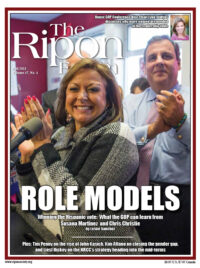The famed screenwriter William Goldman once wrote a book about Hollywood called, Adventures in the Screen Trade. In it, he discussed his career working in the film industry and his experience as the creative force behind such hits as Marathon Man and Butch Cassidy and the Sundance Kid. He also offered up what remains one of the most widely quoted observations about moviemaking today:
“Nobody knows anything,” he wrote.
Goldman was talking about Hollywood and, specifically, the inability of filmmakers to figure out what American moviegoers wanted to see. And yet if there was ever a quote that could be applied to Washington, it is this one.
Time and again over the past several years, it seems, conventional wisdom has been turned on its head about what is going to happen next in politics and what the American people want in their elected leaders. Remember Hillary’s inevitability in the 2008 presidential campaign? Or the impossibility in late 2009 that Obamacare would actually be approved? Just over a year ago, nearly every top Republican thought Mitt was a cinch, while just over a month ago, nearly everyone thought Republicans were toast.
Nobody knows anything.
That is why predictions about the 2014 election are so futile. It’s also why, in this latest edition of the Forum, we don’t focus on predictions about next year’s mid-terms. Rather, we focus on the trends that may shape the results. Trends such as:
- The importance of Hispanic Americans in the nation’s political process and why, in their efforts to reach out to and connect with this growing part of the electorate, Governors Chris Christie and Susana Martinez are providing a model that other Republicans should follow.
- The gender gap that continues to plague Republicans and why, in addition to their efforts to close this gap by recruiting more women candidates to run for office, the party also needs to look at filling the ideas deficit that is turning so many women away.
- The growth of special interest groups, and why, by filling the role that has historically been played by political parties in elections, these groups are fueling the political dysfunction that has brought governance in Washington to its knees.
We take a look at these and other trends with some of the nation’s leading thinkers and strategists, including NRCC Executive Director Liesl Hickey, GOP media gurus Leslie Sanchez and Kim Alfano, and veteran election law expert Mark Braden.
This latest edition of the Forum also features a profile of House Republican Conference Vice Chair Lynn Jenkins, an op-ed about the conservative solution to health care reform by Republican Study Committee Chairman Steve Scalise, and an essay by respected political observer Dan Schnur about two laws passed in California that could serve as a model for election reform nationwide.
As with every Ripon Forum, we hope you find this edition informative and interesting, and encourage you to contact us with any comments or questions you may have.
Lou Zickar
Editor
THE RIPON FORUM
louzickar@clu.ccw.mybluehost.me




